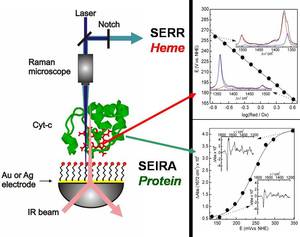Prof. Dr. Peter Hildebrandt
Member of UniCat's Executive Board
Vice-Chair of UniCat since 2007
Research interests
Vibrational spectroscopy, photoreceptors, metalloenzymes, redox enzymes, spectroelectrochemistry, electron transfer, interfacial processes, photoinduced reactions
Research Fields in UniCat
Research Field D2*
Research Field D3*
Research Field E2*
Research Field E3*
Research Field D1
Research Field D4
Research Field E4
* Main Research Fields
Selection of research projects
Relevant News
Professor Katrina T. Forest awarded with an Einstein Visiting Fellowship

We are glad to announce the successful application of Prof. Katrina T. Forest (University of Wisconsin-Madison) for an Einstein Visiting Fellowship. Prof. K. T. Forest will start a new research project on light-driven biocatalysis in Berlin within the fram
Electrografted interfaces on metal oxides for catalysis with highest stability
Diazonium salts were electrografted onto transparent conductive oxides as stable alternatives to conventional anchoring groups for the surface immobilisation of molecular species which are relevant as electrocatalysts or photosensitisers. The interface for
Electrosynthesized MIPs for transferrin: Plastibodies or nano-filters?

A new joint paper of four UniCat groups in the oncoming 'Biosensors & Bioelectronics' vol 105 on Molecular Imprinting of Proteins on Gold Surfaces.
Excellence Strategy: UniSysCat proposal submitted

The designated spokespersons Prof. Matthias Driess, Prof. Arne Thomas, and Prof. Peter Hildebrandt have submitted the full proposal for the Cluster of Excellence “Unifying Systems in Catalysis”, UniSysCat in short.
Temperature dependence of the catalytic reduction of dioxygen by a cobalt complex

The synthesis and characterization of a hexanuclear cobalt complex involving a nonheme ligand system, supported on a Sn6O6 stannoxane core are reported by the UniCat groups of Holger Dau, Peter Hildebrandt, and Kallol Ray.
Sustainability Needs Catalysis Research

"Unifying Systems in Catalysis" (UniSysCat), the succession project of UniCat, is qualified for submitting a full proposal.
Redox-dependent substrate-cofactor interactions in the Michaelis-complex of a flavin-dependent oxidoreductase

New research highlight: Peter Hildebrandt, Holger Dobbek, Ingo Zebger, and coworkers investigate the Michaelis complex of the flavoenzyme xenobiotic reductase A with the reactive reduced cofactor bound to its substrates by X-ray crystallography and resonan
Research Highlight "Reversible light-dependent molecular switches on Ag/AgCl nanostructures"
Nanostructured Ag/AgCl substrates were used to generate reversible and highly efficient light-dependent chemical switches based on adsorbed 4,4’-dimercaptoazobenzene (DMAB). DMAB was formed in situ via laser-induced dimerization either from 4-nitrothiophen
Carbon Monoxide Dehydrogenase Reduces Cyanate to Cyanide

The biocatalytic function of carbon monoxide dehydrogenase (CODH) has a high environmental relevance owing to its ability to reduce CO2. Despite numerous studies on CODH over the past decades, its catalytic mechanism is not yet fully understood. In the pre



